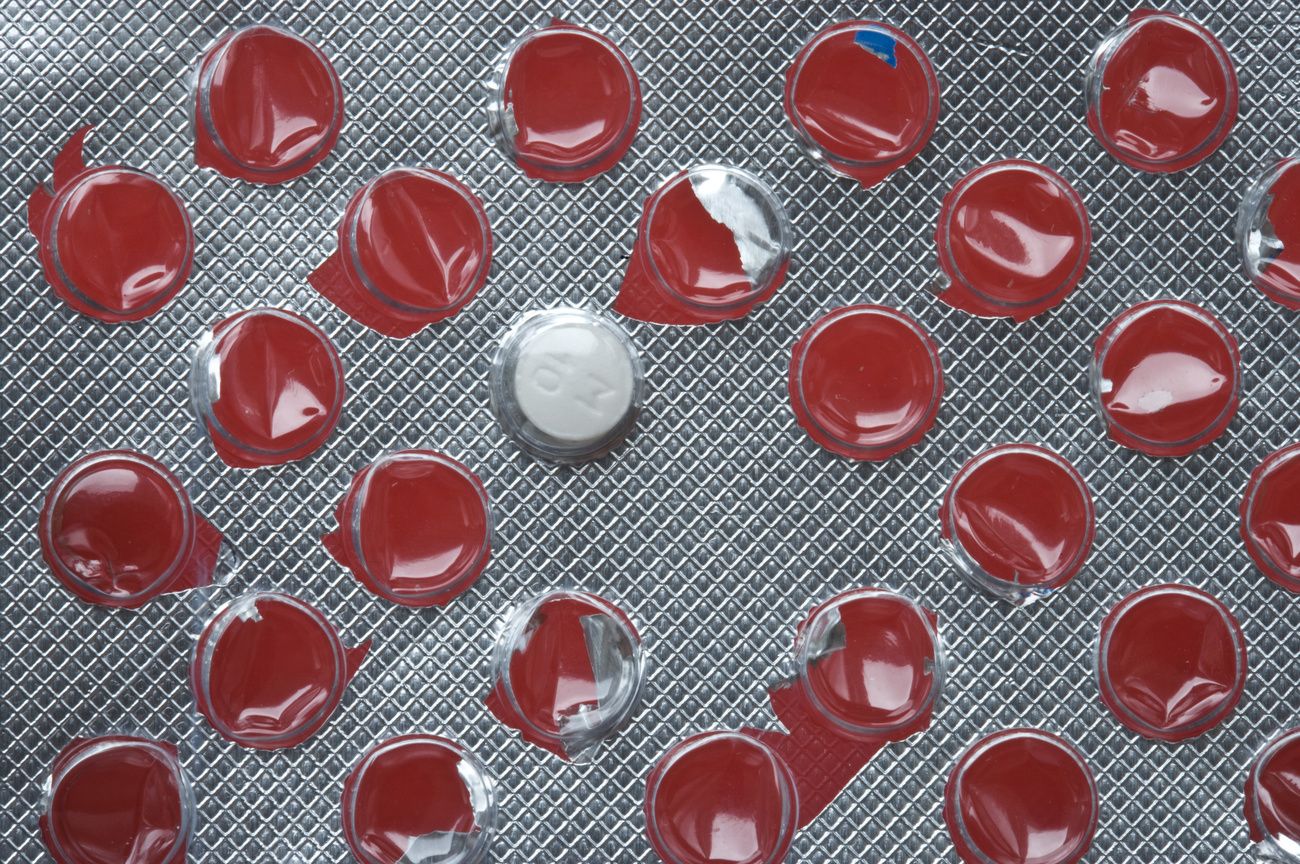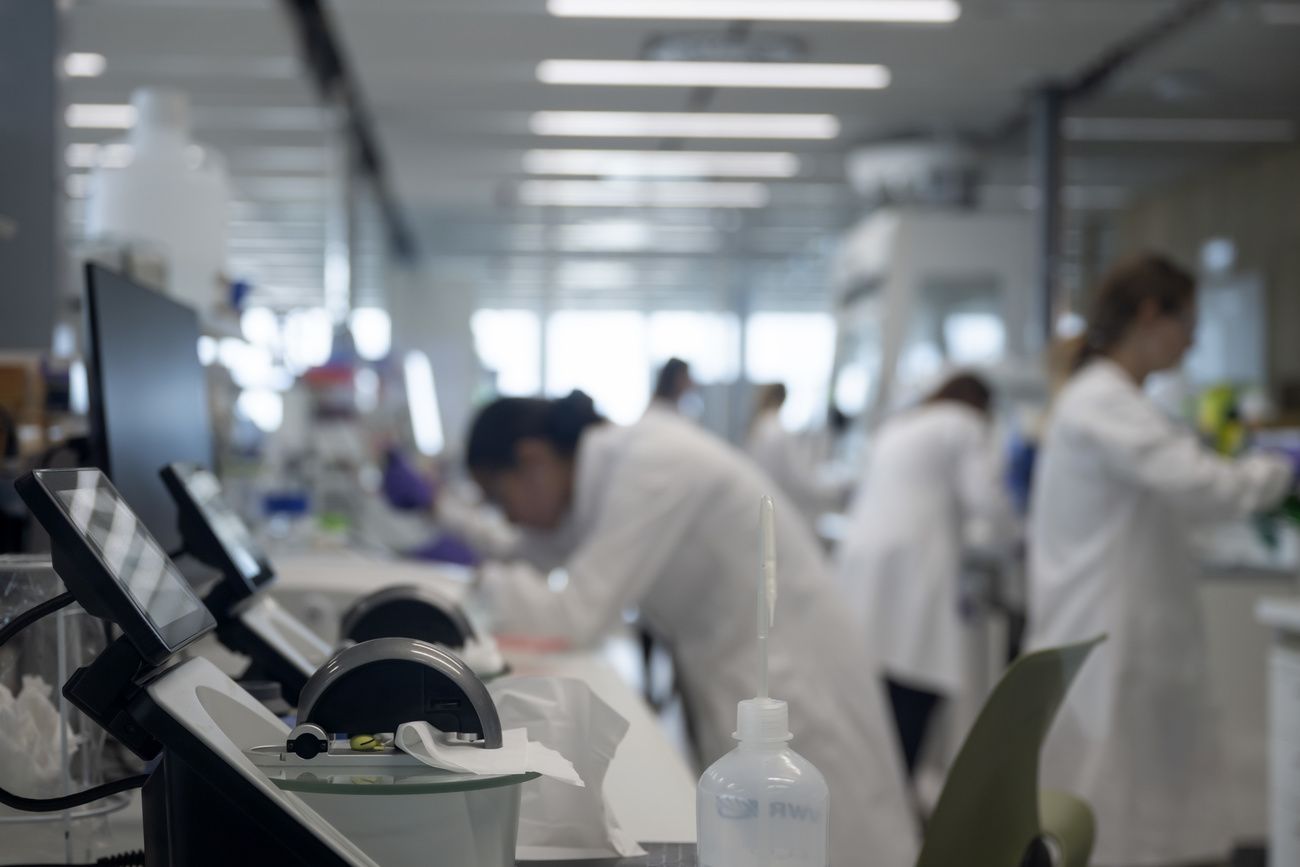
American customs duties looming on pharmaceutical products could harm patients and industry. With investments that move to the United States, they could also question the status quo of pharmaceutical centers like Switzerland.
This content was published on 09 May 2025 – 10:08
In recent weeks, the Swiss Giants of Pharma Roche and Novartis have both announced investments of $ 1 billion in the United States. None of the two companies mentioned the imminent customs tariffs of President Donald Trump, preferring to highlight their long -standing commitment in the country.
But customs duties are the angry subject. According to some experts, these investments are an attempt to appease in the face of Donald Trump’s desire to apply import taxes on pharmaceutical products.
On April 1, the US administration began studying imports of pharmaceuticals and semiconductors to determine their impact on “national security”. According to the “Wall Street JournalExternal link“, The survey could, as early as mid-May, lead to customs duties reaching 25% on pharmaceutical products, their ingredients and any derivative product. And this while pharmaceutical products are exempt from global customs duties, according to an agreement from the World Trade Organization-of which the United States is members, but of which President Trump has threatened to withdraw.
Pharmaceutical products are a handful of products exempt from American customs duties announced on April 2 for 57 countries. These customs duties were suspended 90 days, until July 8, except China. If the suspension is lifted, the United States will apply an increase of 31% on imports from Switzerland. Confederation representatives recently went to Washington to try to negotiate with the Trump administration.
Imposing customs duties on drugs would bring a big blow to the Swiss pharmaceutical industry. The United States is indeed a significant part of the global turnover of the two pharmaceutical giants: more than 50% for rock and around 40% for Novartis.
Pharmaceutical products represent 40% of the total Swiss exports, making it the first exporting industry in the country. A large majority (60%) is intended for the United States. In 2024, these exportsExternal link amounted to some $ 35 billion.
The cost of taxation of maximum customs law of 25% is estimated at around $ 8.75 billion (7.21 billion francs) for Swiss pharmaceutical companies.
The response to the pricing threat
Pharmaceutical groups seek to get around the threat of customs duties. The most obvious solution is to increase production in the United States, which some, like Roche, are able to do using existing production sites.
On April 24, at the conference call on the results of the first quarter, the director general of Roche, Thomas Schinecker, told the media that four drugs in the portfolio – which he refused to appoint – represented 92% of the company’s exposure to customs duties.
Production in the United States is already sufficient for three of these drugs, and the company began to transfer technology for the fourth, which has never been produced across the Atlantic. On site, Roche only works 50% of its production capacity for drug substances. This “leaves us a big room for maneuver to increase production in the United States,” said Thomas Schinecker.
For companies whose production activities are more decentralized and globalized than those of Roche, bypass customs duties should prove more expensive and more complicated.
“The relocation of a short -term production site is almost impossible. Ensuring the quality, authorizations and construction of an installation takes at least five to ten years, ”underlines René Buholzer, the boss of Interpharma, the umbrella organization of the Swiss pharmaceutical industry based on research.
Novartis did not answer our questions about the immediate measures taken to mitigate the effects of customs tariffs. A spokesperson told Swissinfo.ch by email that “the investment provided by the company clearly shows that we continue to focus on the United States”.
Recent investments announced by Roche and Novartis, among other large pharmaceutical companiesExternal linkconstitute a clear signal: companies rethin the place of production of their future drugs according to a wide range of factors, including geopolitics and concerns in matters of national security.
Announced in early April, the investment of 23 billion dollars in Novartis in the United States will set up two innovation centers, four manufacturing factories and create 1,000 jobs within the company, so that “all key drugs in Novartis intended for American patients will be manufactured in the United States”.
In the same way, Roche, which already employs 25,000 people on 24 American sites, announced at the end of April an investment of $ 50 billion across the Atlantic. The pharmaceutical giant has not given a calendar, but said that once these new capacities implemented, it “will export more drugs from the United States than it will matter”.
Growing competition
Investments in the pharmaceutical industry in the United States place Switzerland in a difficult position. On the one hand, as revealedExternal link The “Tages-Anzeiger” on April 23, the Swiss government wishes to show President Trump that he has gestures to improve trade balance with the United States.
-On the other hand, the announcement of an increase in investments outside of Switzerland adds to concerns about the capacity of the country to remain attractive to industry. In terms of research and production of pharmaceutical products, Switzerland plays above its category, the pharmacy exceeding the banking sector in terms of contribution to GDP: some 50,000 people, or 5.4% of the country’s total workforce in 2022, work there.
But with just over nine million inhabitants, Switzerland remains a small market, a disadvantage while businesses are increasingly implanting their production sites near their customers.
“In recent years, our strategy has consisted in ensuring that we had a strong presence of production on all the main markets,” said the boss of Roche. In fact, on many of these markets, China included, it is essential to have a local presence, including in terms of manufacturing, to have access to the market. ”
Roche and Novartis have both invested in research and development, production and partnerships in China; In the past two years, Roche has signed two license agreementsExternal link With Chinese biotechnology companies, for an amount of around 1 billion dollars.
Recently, companies have also made investments in Switzerland. But they are far from equaling the total investment of $ 73 billion in the United States, one of the largest pharmaceutical investments in a single country in the last decade.
“Every ten years, major reinvestments are made [dans le secteur pharmaceutique]. The real question is: where are they going? And, more and more, the answer is no longer Switzerland, ”reacts René Buholzer, the boss of Interpharma.
Maintain attractiveness
Faced with pricing pressure, companies intensify their requests from European governments, including Switzerland, so that they improve incentive measures and maintain companies on their territory.
On April 23, the bosses of Novartis and the French company Sanofi wrote an open letterExternal link To the “Financial Times”, asking Brussels to “rectify the shooting” in order to attract new pharmaceutical investments. “In a context of loss of competitiveness in the European biopharmaceutical industry, the uncertainty of customs duties further reduces the incentives to invest in the EU,” they argued.
Pharmaceutical companies have said for years that increasing pressure to lower drug prices, delays in drug approval and the increase in compliance regulations make the EU less competitive.
Between 2010 and 2022, pharmaceutical research and development (R&D) expenses in Europe increased at an average annual rate of 4.4%, from 27.8 billion euros (26.1 billion Swiss francs) to 46.2 billion euros (43.30 billion francs). During the same period, pharmaceutical R&D expenses in the United States increased at an average annual rate of 5.5%, while China recorded a rate of 20.7%, although it started from a much lower level.
Thomas Schinecker, believes that “there is too much bureaucracy” in Europe, which stifles economic growth. He insists on the need to invest in “key and future industries”, including the Pharma. What the United States as China has understood, he says.
For his part, the director of Interpharma believes that customs duties are not a good thing for industry. But he also sees in this major turning point an opportunity for Switzerland: “Many countries are currently taking targeted measures in order to increase their attractiveness as a reference site for the life sciences.”
René Buholzer here refers to the discussionsExternal link which took place at the beginning of April between European pressure groups in the pharmaceutical and biotechnological sectors and the president of the European Commission, Ursula von der Leyen. According to him, Switzerland “must develop a clear strategy” for the life sciences, a fortiori in current circumstances.
“Trump’s customs duties harm patients and industry. And yet, they accelerate the transfer of investments from Europe to the United States, ”he insists.
>> Donald Trump’s customs duties also have an impact on diversity policies practiced by multinationals based in Switzerland:
Plus

Plus
How Donald Trump’s attacks on diversity could affect the development of drugs
This content was published on 01 avr. 2025 Why abandon the diversity objectives in clinical research could reduce the development of drugs for several decades.Read more how Donald Trump’s attacks on diversity could affect the development of drugs
Text reread and verified by Veronica Devore, translated from English by Albertine Bourget/SJ










